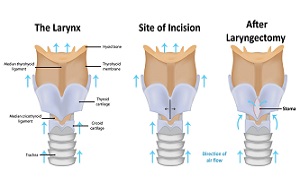Head & Neck Cancer
Cancer occurs when the cells grow abnormally and also invade nearby tissues and eventually spreading to other organs in the body through the bloodstream or the lymph nodes.
Head and neck cancers include cancers in the larynx, throat, lips, mouth, nose and salivary glands.
Causes of Head & Neck Cancer
- Frequent and excessive consumption of alcohol & smoking of tobacco.
- Prolonged exposure to sun may cause skin cancer of head & neck.
- Human papillomavirus (HPV) is a risk factor for head & neck cancer.
- Poor oral & dental hygiene.
- Weak immune system.
- Inhaling certain chemicals like asbestos, wood dust, paint fumes at work may increase a person’s risk to head & neck cancer
Signs & symptoms of Head & Neck Cancer
- Persistent sore throat.
- Red or white matched in the mouth.
- Blood in saliva.
- Swelling in the neck that does not heal
- Pain or difficulty in chewing, swallowing or moving the jaw or tongue.
- Persistent nasal congestion.
- Foul mouth odour, not related to hygiene
- Chronic sinus infections
- Frequent headaches
- Hearing impairment
- Facial numbness
Diagnosis of Head & Neck Cancer
Physical examination
Physical examination to check any lumps on the neck, lips, gums and cheeks.
Blood & urine tests
Blood & urine tests help determining the cancer.
Endoscopy
Biopsy
CT scan
MRI
Bone Scan
PET-CT Scan
Treatment options for Head & Neck Cancer
Treatment of Head & Neck cancers include a combination of two or more of the following:
Surgery
Surgery is considered the first line of treatment for Head & Neck Cancers, specially early stage head & neck cancers. Surgery may be:
Laryngectomy
Laryngectomy- It can be partial largynectomy or total largynectomy. For small laryngeal cancer, partial largynectomy is recommended, only the portion of the voice box affected by the cancer is removed. For more extensive laryngeal cancers, a total laryngectomy may be the recommended treatment, the entire voice box is removed.
Neck Dissection
Flap Surgery
Chemotherapy
Chemotherapy is the use of anti-cancer drug that helps to slow or stop the growth of rapidly dividing cells that cause cancer. It prevents the growth of rapidly dividing cells by killing the dividing cells.
Despite its side effects, chemo is still the most widely used cancer treatment option. Unlike radiation and surgery which treats cancer cells at particular locations, chemotherapy drugs can kill cancer cells that have metastated (spread) to different organs in the body.
Radiation Therapy
Radiation Therapy is a kind of cancer treatment that uses high doses of radiation beams to kill cancer cells to shrink the tumors. Radiation kills the cancer cells by destroying the DNA. Cancer cells with damaged DNA fail to multiply and die. They are then removed by the body’s mechanism.






